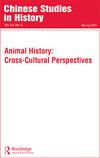不合时宜的唐吉诃德:五四时期的“新派中旧派”
IF 0.2
4区 历史学
0 ASIAN STUDIES
引用次数: 0
摘要
摘要从晚清到五四时期,知识分子在思想、观念和精神性质上有两条路线。一个是从康有为开始的浪漫派文人康有爲 和梁启超梁啓超 从“戊戌”到“五四”新青年,另一个是从曾国藩开始的新儒家知识分子曾國藩 和张志东張之洞 到学衡集团學衡派. 学衡派是新派中具有古典情怀的人物,堪称“新派中的老派”。五四时期,启蒙派知识分子活跃于舆论场,学衡派知识分子坚守书院的“新庙”。然而,在学衡集团内部,不同于像陈寅恪这样的学术知识分子陳寅恪 和刘仪征柳詒徵, 吴吳宓, 和梅光迪梅光迪 想成为在社会上有影响力的公共知识分子,能够与胡适竞争胡適 和陈独秀陳獨秀 公共空间话语权。最终,由于他们对时间和空间的误判,他们无法逃脱边缘化的命运。此外,吴、梅光第的行为和观念的偏离和错位,也损害了新古典主义者的人格形象。本文章由计算机程序翻译,如有差异,请以英文原文为准。
The untimely Don Quixotes: “The old school within the new school” during the May Fourth period
Abstract From the late Qing to the May Fourth period, there were two lines of intellectuals when it came to thought, concepts, and spiritual nature. One was the literati of the romantic school from Kang Youwei 康有爲 and Liang Qichao 梁啓超 of the Hundred Days’ Reform to the New Youth of the May Fourth, while the other was the Neo-Confucian intellectuals from Zeng Guofan 曾國藩 and Zhang Zhidong 張之洞 to the Xueheng group 學衡派. The Xueheng group were figures within the New School who held classical sentiments and could be called the “old school within the new school.” During the May Fourth period, while Enlightenment School intellectuals were active in the arena of public opinion, the Xueheng group intellectuals held fast to the “new temple” of the academy. Within the Xueheng group, however, unlike academy intellectuals such as Chen Yinke 陳寅恪 and Liu Yizheng 柳詒徵, Wu Mi 吳宓, and Mei Guangdi 梅光迪 wanted to be public intellectuals influential in society who could compete with Hu Shi 胡適 and Chen Duxiu 陳獨秀 for the right of discourse in public space. In the end, they could not escape the fate of marginalization due to their misjudgment of both the time and space. Furthermore, the departure and misplacement of the actions and concepts of Wu Mi and Mei Guangdi also harmed the image of the character of the new classicists.
求助全文
通过发布文献求助,成功后即可免费获取论文全文。
去求助
来源期刊

CHINESE STUDIES IN HISTORY
Multiple-
CiteScore
0.20
自引率
0.00%
发文量
5
期刊介绍:
Chinese Studies in History makes noteworthy works and important trends of historical study in the Chinese-speaking world available to English-language readers. Thematic issues present original papers or articles from academic journals and anthologies that have been selected for translation because of their excellence, interest, and contribution to scholarship on the topic. Topical coverage ranges over all periods and subfields of Chinese and East Asian history as well as more general theoretical and historiographical questions of interest to historians of many specialties. Each issue includes a substantive introduction by the editor or specialist guest editor.
 求助内容:
求助内容: 应助结果提醒方式:
应助结果提醒方式:


